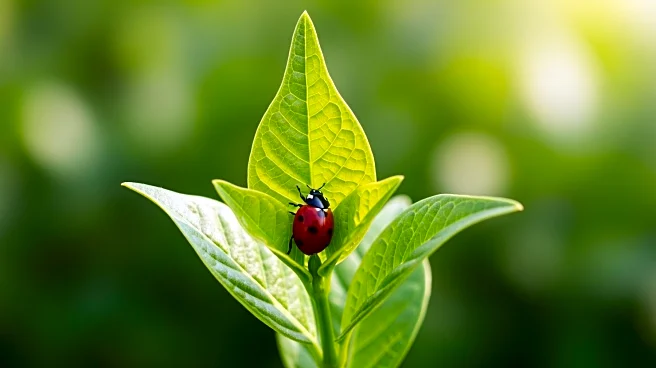What's Happening?
The North America biorationals market is experiencing significant growth, driven by increasing demand for eco-friendly pest control solutions and sustainable farming practices. Valued at approximately
USD 5.13 billion in 2024, the market is projected to reach USD 8.85 billion by 2033, with a compound annual growth rate (CAGR) of 6.24%. Key players such as Valent BioSciences LLC, FMC Corporation, and Certis USA LLC are leading the market with innovative products and strong R&D investments. Recent product launches include bio-insecticides, bio-fungicides, and bio-herbicides, emphasizing organic and high-value crops. The market expansion reflects a broader trend towards reducing chemical residues and improving soil health in agriculture.
Why It's Important?
The growth of the biorationals market is significant for the agricultural industry, as it aligns with global efforts to promote sustainable farming and reduce reliance on synthetic pesticides. Biorationals offer natural pest control solutions with minimal environmental impact, supporting healthier ecosystems and safer food production. The market's expansion is driven by consumer demand for residue-free produce and regulatory pressure to adopt sustainable practices. As key players continue to innovate and expand their product offerings, the biorationals market is poised to play a crucial role in transforming agricultural practices, enhancing food security, and supporting environmental conservation.
What's Next?
The North America biorationals market is expected to continue its growth trajectory, with further investments in R&D and product development. As regulatory bodies increase pressure to adopt eco-friendly pest control solutions, the market may see increased adoption of biorationals across various crop types and farming systems. Key players are likely to expand their operations and collaborate with stakeholders to enhance supply chain networks and market reach. The success of biorationals may also inspire further innovation in sustainable agriculture, driving advancements in pest management technologies and supporting global sustainability goals.
Beyond the Headlines
The expansion of the biorationals market highlights the potential for sustainable agriculture to address environmental challenges and support food security. By reducing chemical inputs and promoting natural pest control, biorationals contribute to healthier ecosystems and improved soil health. This market growth reflects a broader shift towards sustainable farming practices, where technology and innovation play a key role in achieving environmental and economic goals. As the market continues to evolve, stakeholders may need to navigate ethical considerations related to biodiversity, food safety, and the impact of agricultural practices on local communities.










